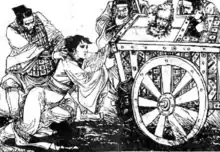Ti Ying
Ti Ying (Chinese: 緹縈) was a woman known for persuading the Emperor Wen of Han to abolish the "Five Punishments", as told in the Western Han folktale, "Ti Ying Saves Her Father" (Chinese: 缇萦救父).
Ti Ying (淳于緹縈) | |
|---|---|
 | |
| Born | ca. 174 BC |
Biography
Ti Ying was the youngest of Chunyu Yi's five daughters. Her father was originally a low ranking official, but after studying with a famous doctor, he was promoted to high rank. Ti Ying grew up to be very humble and generous thanks to her father's example, treating everyone equally, regardless of whether the person was of common birth or of the nobility. However, after her father couldn't save the life of a noblewoman, the devastated husband claimed that it was Chunyu Yi's treatment that caused the death of his wife. As this nobleman was very influential at that time, Chunyu Yi was taken away without a proper investigation.
When Chunyu Yi was taken away, he knew he would be subjected to one of the Five Punishments. Knowing that he had no one who could appeal for him, he looked at his daughters and said “I will be sent to the capital for punishment where no woman can follow and I have five daughters. If only I had a son!” In the pre-modern China, women did not have a say in the court nor in society, unless they had some sort of special status. After hearing what her father said, Ti Ying made up her mind and followed her father on a journey to the capital. On the journey there she endured pain and hunger. Once she arrived at the capital, she made an appeal on behalf of her father to Emperor Wen himself instead of going to any of the officials. She made the appeal despite knowing that, as a young girl, her appeal would likely be treated with derision and even seen as improper conduct. She also took a novel approach in her appeal. Instead of her writing about her father's good nature and accomplishments to show he deserved leniency, as might have been expected, she instead wrote about the legal tradition of Five Punishments, showing how cruel and unethical they were.
After hearing that a young girl had written a letter of grievance to him, the Emperor was eager to read what the letter was about. In her letter, she wrote, "'Once a man is executed, he cannot come back to life. Once a man is mutilated, even if he proved to be innocent later, he would be disabled for life, and there is no way to reverse the suffering he experiences. Even if he wishes to start anew, he will be unable to do so. I have heard stories of how a son can redeem a father’s guilt,' she continued. 'As a daughter, I am willing to redeem my father’s sin by being your slave for the rest of my life. I beg you to spare him from this punishment, and thus he will have an opportunity to make a fresh start.'" Emperor Wen was deeply moved by Ti Ying's letter. Not only was it well written, it also pointed out the cruelty and unjust of the Five Punishments and how it did not give the convicted a chance to defend themselves. This letter also impressed many officials in the court. Many praised the way in which she endured hardships along with her father and was willing to become a slave in exchanged for her father's life.
After reading this letter, Emperor Wen pardoned Ti Ying's father and declined her offer to become a slave, he also abolished the cruel Five Punishments standard. Soon the story of Ti Ying's bravery was spread around the country and many would wished to have a daughter like her.
References
Sources
- Bullock, Olivia. "Badass Ladies of Chinese History: Ti Ying". Badass Ladies of Chinese History: Ti Ying. 汉 语世界. Retrieved 15 November 2019.
- "缇萦". 缇萦. 临淄区人民政府. Retrieved 22 November 2019.
- 杨, 英. 101個決定孩子命運的好習慣. 飛翔時代. Retrieved 2 December 2019.
- 张, 敏杰 (1 September 2013). 一百个中华传统美德故事. Beijing Book Co. Inc., 2013. p. 93. ISBN 9787539270241. Retrieved 2 December 2019.
- 缇萦救父. Beijing Book Co. Inc. 1 May 2014. ISBN 9787999032656. Retrieved 2 December 2019.
- Lu, Hong; Miethe, Terance D. (2010). China's Death Penalty: History, Law and Contemporary Practices. Routledge. p. 192. ISBN 9781135914912. Retrieved 2 December 2019.